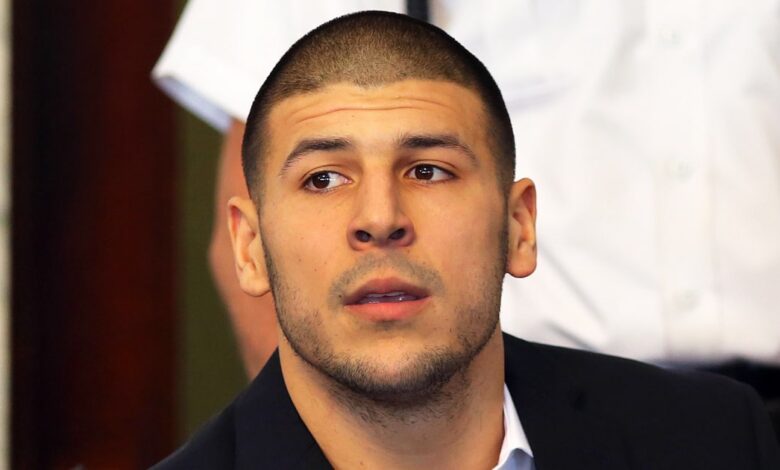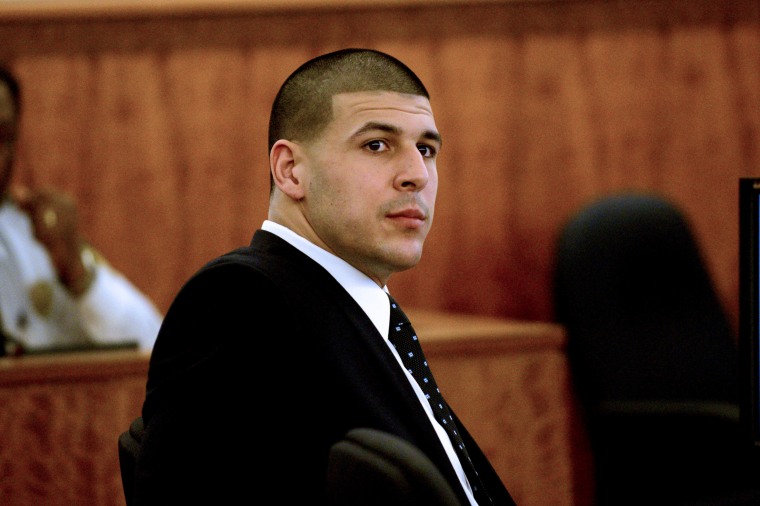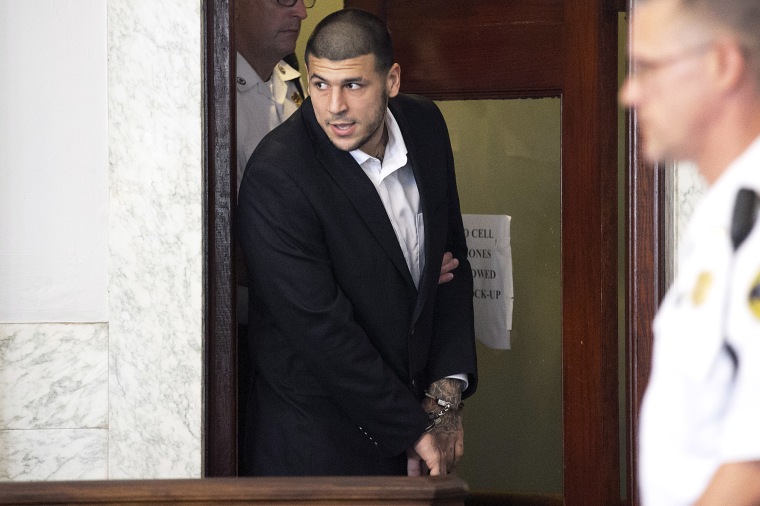What Happened to Aaron Hernandez? Inside the True Story

This story discusses suicide. If you or someone you know is struggling or in crisis, help is available. Call or text 988 or chat at 988lifeline.org.
The rise and lurid fall of one of the NFL’s most notorious players is dramatized in the new FX show “American Sports Story: Aaron Hernandez,” about the former New England Patriots tight end.
Hernandez’s origins as a football star, his rise to fame in college and the NFL, and his death at 27 following a murder conviction are examined in the new series from executive producer Ryan Murphy.
Here’s what to know about Hernandez’s life.
Who was Aaron Hernandez?
Hernandez was Connecticut’s Gatorade Player of the Year for football as a senior in high school and then rose to prominence as an All-American tight end at the University of Florida from 2007-09.
His coach at Florida was Urban Meyer, who has led teams to three national championships in his career. He led Florida to the national title in 2006, one season before Hernandez joined the program as a freshman.
Hernandez was a star for the Gators, but Meyer grew frustrated with him over his marijuana use and class absences, according to a book published in 2018 by Hernandez’s attorney, Jose Baez. (Hernandez said in 2013 he violated the team’s substance testing policy once, following a report that he failed multiple drug tests at Florida and received special treatment. Meyer also denied that report, saying Hernandez was “held to the same drug testing policy as every other player.”)
After three seasons, Meyer told Hernandez to enter the NFL draft because he would not be welcome back to the program due to his marijuana use and poor grades, per Baez’s book.
Hernandez was drafted in 2010 in the fourth round by the New England Patriots, with whom he played for three seasons.
The New England native blossomed into a star in 2011 for the Patriots, teaming up with Rob Gronkowski to give them a formidable tight end tandem as targets for legendary quarterback Tom Brady. They reached the Super Bowl before falling to the New York Giants.
Hernandez’s final season with New England came in 2012, when they reached the AFC title game and lost to the Baltimore Ravens.
Why did Aaron Hernandez go to prison?
Hernandez was arrested and charged in the 2013 shooting death of Odin Lloyd, a semipro football player and friend who was dating the sister of Hernandez’s fiancée.
Hernandez was convicted of first-degree murder in 2015 for shooting Lloyd in a deserted industrial park and sentenced to life in prison without parole.
Prosecutors said Hernandez was angry with Lloyd at a nightclub two nights before the shooting, according to NBC News’ report from 2015. They showed surveillance video of him in his home holding what appeared to be a gun, and said a marijuana joint found near Lloyd’s body had DNA from Lloyd and Hernandez on it.

His defense team said Hernandez was there when Lloyd was killed but the act was carried out by two friends.
Hernandez was also charged with murder of two men in a fatal 2012 drive-by shooting outside a nightclub in Boston, but was acquitted in 2017, just days before his death.
His murder conviction was also thrown out by a Massachusetts judge a month after his death in 2017. Hernandez was in the midst of an appeal when he died in prison. A Massachusetts rule stipulates that when a defendant dies in the midst of an appeal, the conviction is vacated and the indictment is dismissed.
How did Aaron Hernandez die?
The former star was found dead in his jail cell on April 19, 2017, of an apparent suicide, a Massachusetts correction official said. He was 27.

In May 2017, Hernandez’s last letter to his fiancée, Shayanna Jenkins-Hernandez, was revealed in a court filing. He asked her in the letter to “tell my story fully but never think anything besides how much I love you. This was the supremes, the almightys plan, not mine! I love you!”
He didn’t mention suicide specifically, but this was one of three letters that officials described as suicide notes, NBC News reported at the time.
Inmates told police they had no reason to believe the Hernandez was suicidal, according to an investigative report released by the Massachusetts Department of Correction in 2017.
“He had been talking about the NFL and going back to play even if it wasn’t with the Pats,” one inmate told investigators.
In an interview with Dr. Phil McGraw on a 2017 episode of his show, Jenkins-Hernandez said Aaron Hernandez was upbeat in their final conversation.
“I don’t think this was a suicide,” she said in the interview.
In September 2017, tests of Hernandez’s brain found that he had chronic traumatic encephalopathy, aka CTA, which can cause memory loss, impaired judgment and violent behavior. The condition has been found in numerous former NFL players and has been associated with cognitive changes that can cause previously inexplicable behavior, Dr. Ann McKee of the Boston University School of Medicine said in 2017.
What is “American Sports Story: Aaron Hernandez” based on?
The series draws its story from the podcast “Gladiator: Aaron Hernandez and Football Inc.,” created by The Boston Globe and Wondery.
The six-part podcast traces Hernandez’s beginnings as a football star and his troubled family history while growing up in Connecticut, to his infamy in becoming the first active NFL player, to be accused of multiple murders.
Linda Pizzuti Henry and Ira Napoliello of The Boston Globe served as executive producers of the show along with Murphy and nine others.
Source link

